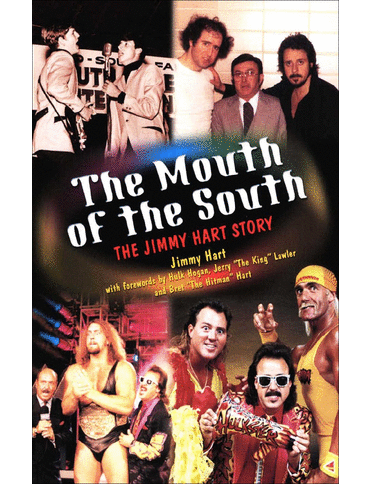
The Mouth of The South
The Jimmy Hart Story
Jimmy Hart
Published: 2004
Pages: 179
Synopsis: The auobiography of WWE Hall of Famer Jimmy Hart.
You see, I was caught in the middle of something, and I didn't know it. At the time, I guess Jarrett and Lawler were almost feuding. And in this particular instance, Jerry Jarrett wasn't just mad because I wasn't in Blytheville, he was made that Lawler wasn't there either.
"I want people who work for me to love wrestling first," he said. "If Lawler wants to do his music thing, that's fine. But it's wrestling that made him, not music. And if he had been in Blytheville we would have done about $3,000 instead the $800 we ultimately drew."
So, even though Jarrett was really mad at Lawler, there was nothing he could do to his partner and biggest star. And then he took it out and me. He couldn't fire his partner - but he could fire his partner's accomplice.
Tears rolled down my cheeks. In a flash, I was being exiled from the world I'd come to love most - professional wrestling. It truly broke my heart.
No story on the history of professional wrestling, at least over the past 30 years, would be complete with ample mention of Jimmy Hart . From Hulk Hogan to Bret Hart to The Big Show to Jerry Lawler, "The Mouth Of The South" managed more top names in the business than arguably anyone else.
Behind the scenes, he's a force to be reckoned with, too: managing Hogan's real-life business dealings, composing classic theme songs such as Shawn Michaels's "Sexy Boy" and working backstage for WCW, the XWF and even the CMT show Hulk Hogan's Celebrity Championship Wrestling. Plus, how many old-school fans remember Hart's high-pitched voice screaming "Come on, Hammer!" into the ever-present megaphone?
So I really thought I'd enjoy this book, but with all due respect, the autobiography falls flat. It was almost as if Hart was too busy with another project to give this project the attention it needed.
The first thing that struck me was the timeline. It was published in 2004, yet he starts the biography sometime in 2000 when he was orchestrating those "DJ Challenges" in WCW. Thus, the demise of WCW and his XWF project are never discussed. So fine, I figure, perhaps he'd just been shopping this around for a long time and it hadn't been updated since. That's certainly an acceptable reason.
Yet, halfway through the book he refers to WWE (which didn't make its debut until 2002, I believe), and then he alternates with the name WWF repeatedly. He also mentions the deaths of Crash Holly and Curt Hennig, which happened in 2003. And in the photo section, he has pictures that were clearly taken at WrestleMania XX.
The other thing that bugs me is that there are several spelling and factual errors. Maybe he didn't know how to spell "Arnold Skorlind" or "Sherri Martell". But certainly he should know that he DIDN'T manage Smash and Crush to the tag team championship (he may have been in the corner for a match against the Hart Foundation, but Demolition had already won the tag titles by then, and at that... it wasn't even the Smash and Crush version!).
And that the song he wrote for Honky Tonk Man was NOT called "Hunka Hunka Honky Tonk Man". It's called a proofreader, Jimmy; get one.
I can't say there's a lot of new information in here. Lawler covered off a lot of the Memphis material in his book (which came out first), and a lot more descriptively. Maybe that's not Jimmy's fault -- I mean, they're his stories too -- but when that's a good 80 percent of your book, the stories should at least be slightly different.
I also wanted to know a bit about Jimmy Hart the person, not just the wrestling character, and that doesn't seem to come through. He mentions his family only in passing, and with less prestige or importance than he talks about, say, The Rougeau Brothers. I remember reading about his son, Jimmy Hart Junior, participating in Operation Desert Storm or something. Yet the only mention of him in the book is a photo of him gawking at a Playboy Magazine with Torrie Wilson on the cover. Classy.
One redeeming quality -- he at least seems like a decent, dependable guy, and he doesn't needlessly knock people the way Flair, Piper or Hogan have done in their biographies. That part is refreshing, but not nearly enough to give a recommendation here.
Rating: Bowling-Shoe Ugly. If you're looking for a nostalgia pop from a classic WWF manager, try Bobby Heenan's "Bobby The Brain". There's really nothing to see here.





